Beth Kephart's Blog, page 137
April 1, 2013
birthday flowers (and thanks)

To my dear friends who have written today, sent notes, shared love—thank you. It was a quiet, working day, and you lifted my spirits immensely.
And to my brother-in-law, Mario, who sent white flowers—what a gift to have this gift today. Thank you.




Published on April 01, 2013 14:27
March 31, 2013
Grateful to Nicole Duran, at St. John's Presbyterian, for Easter Day
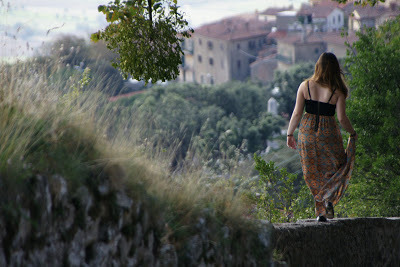
Nine or so months ago, Dr. Nicole Duran quietly slipped into her role as a transitional minister for my own St. John's Presbyterian Church and—without overt fanfare—changed the lives of many. She never gave the expected sermon. She brought intelligence to history and now to the stories of then. She found an old stone baptismal font long wasting away on the church property and installed it to its proper glory—simply, almost matter of fact. Nicole engaged the young with words and seeds, felt boards and icons. She visited those who had fallen ill, spoke eloquently and with genuine emotion at funerals, inquired after others, attended to small fractures and bigger ones, and listened. Nicole Duran is not an overt entertainer; she doesn't need to be. She is, instead, a quiet, never self-congratulatory innovator, someone who has something to say, and how I have loved paying attention to the connections her fine mind makes, how I have loved the resonant power of her messages—relevant, real, and searching.
Today Nicole gave an extraordinary, alive, personal Easter Sunday sermon—looked at us through the thick black frames of her glasses and said precisely what she thought about religion today, the role of a holy place in our lives, the difference between seeking out the familiar for familiarity's sake and finding faith in the changing and new. And then, during communion, she invited every person in that quiet church to take a single flower from so many flower-filled vases and lace it into the netting of a large wooden cross she'd had built for us. Tulips, roses, carnations, twizzlers of blue and red, striped petals—one by one we laced our flowers in, and when we were done, that cross was alive, the dark day was bright, and we had lived Easter.
People touch our lives. Sometimes they don't know just how much they do, or why. I will never forget Nicole Duran—transitional but not temporary—nor this particular Easter day. She is a woman walking a stone wall in a simple dress, lifting her hopes—for us—to the sky.




Published on March 31, 2013 15:19
March 30, 2013
"The Rise of the Failure Memoir," my failures, and other ruminations

A list of the things that I did wrong in writing the first 200 pages of my Florence novel:
* Having the audacity to think that I could fit it in during this season of Extreme Busyness (though I had to fit it in, on behalf of a fellowship project I was teaching).
* Choosing to escape the frightening avalanche of emails by taking the book off the computer altogether and writing it in small spurts on the iPad. Good for scenes. Horrific for continuity.
* Giving myself a tremendously complex set of plot points and intersections to manage with a brain now too crowded to manage anything but the bare rudiments of daily life.
* Pushing ahead through the panic, as opposed to calling the panic off completely, and reconsidering. (But I had to push ahead; I was teaching this novel to a student.)
Finally, a few weeks ago, I did stop. Threw almost all of what I had away and started over. New technology. Simplified plot. More sleep. Less work at midnight hours. Less anxiety about the mountains of books and emails flooding in. Yesterday, Friday, was the first day since I began the book last October that I could work on it for an entire continuity-seeding stretch. Last night was the first night that I slept, unpanicked. There's a ton of work to do. But there's a working foundation.
Since I was giving myself some breathing room I decided to go one step farther down the easing road and read through some of the New Yorkers that have gathered here in this season of Extreme Busyness. First up: Giles Harvey's contemplations, "Cry Me a River: The Rise of the Failure Memoir."(March 25 issue) A look at the crop of memoirs that have emerged from failed novelists. Memoirs about failures—hmmm, I thought, I could have written one of those, if I didn't already understand that we all have our failures, our shames to work through.
Most interesting to me was this paragraph about the failure of the novel in our era—something we've all heard much about. Harvey is reflecting on David Shields (that inveterate provocateur) in this passage.
Shields tells a story about how he reached this conclusion ["that the novel is no longer up to the task of representing contemporary life"]. In the eighties and nineties, he spent "many, many years" trying to write a novel about this country's obsession with celebrity culture through the lens of a married couple's domestic life, a kind of American version of Kundera's "Unbearable Lightness of Being." The project stalled when Shields came to find the conventional novelistic apparatus (plot, dialogue, character) cumbersome and irrelevant to his deepest concerns. He discovered that the essayistic digressions he had written and was planning to insert into his novel were themselves the book he wanted to write.... "Forms are there to serve the culture, and when they die, they die for a good reason—or so I have come to believe, the novel having long since gone dark for me."
I'm not going to stand in full Shields agreement here, or in agreement with every one else who says the novel is dead. Because I'm still reading and loving novels, and I'm still learning, from the best of them, what language can do, what stories can be, what humanity is capable of. The novel has not gone dark for me—not as a reader and not, if I can just stay focused, as a writer. Light is hard to come by, true. But I'm obsessed with the light.




Published on March 30, 2013 09:18
March 29, 2013
Good Friday
Published on March 29, 2013 11:29
March 28, 2013
The End of the Point/Elizabeth Graver: Reflections

You can go to school and hope to learn to write. Or you can read Elizabeth Graver's fourth novel, The End of the Point. How are words turned into people—true people, real people, you know you've met them people? How does land and sea—silent, mutable, endangered, persistent—become not just character but plot? How are generations whooshed across pages, their presence felt? What is the alchemy of omniscience? What is alive inside the novelistic I? How is time stippled and stopped? What do you do with all that you have come to know (with what you have researched) so that no one ever guesses that you weren't born with all that knowing in your head?
(The names of birds, the dimensions of a porpoise skull, the chemical cousins of Agent Orange, the terminology of madness, the songs of WW II, the rules of 1940s dance halls, the economics of development, the name of a condition signaled by coke-colored urine.)
Ask a question; find its answer here. Study every sentence of this magisterial, evocative novel. Read it very slow. Tell those who wish to interfere that you are doing something important. You are reading Elizabeth Graver. You are learning how to write.
Graver's novel—about a jut of land called Ashaunt Point and the generations of one family who take their peace and healing there—is a stunning achievement. "With grace and subtlety, Elizabeth Graver illuminates the powerful legacy of family and place, exploring what we are born into, what we pass down, and what we preserve, cast off, or willingly set free." That's what the jacket copy promises, and that indeed is what Graver delivers—in sentence after sentence of most immaculate prose.
I could flip through, quote from any page. Here: I present Elizabeth Graver's gardens, though I could just as easily have given you her birds (you know my obsession with birds), or the notes between a child and her nanny, or the disappointments that rise up between a mother and her son, or an old marriage healed. But here are Graver's gardens:
Her focus has narrowed, she knows what she wants; in this case; it's the flowers—to look and look. At night, and in the afternoons when the pain clamps her hard inside its jaws, the garden follows her, a dreamscape unspooling, brighter than the wildflowers and the white-pink roses grown spindly on her own trellises; brighter too than her own walled garden, bee balm blooming now, asters on the verge, the lupine (over) with its fuzzy, blackened rattle pods that could be cracked for seeds to nick, soak, plant.
Such a book. And for those who wonder, who keep track of such things—I have known Elizabeth through the ether for years, but I insisted on buying this book. On reading it for this blog. On giving myself that pleasure.




Published on March 28, 2013 07:35
March 27, 2013
great not good, students and cookies, my son: on the train home from Penn

On the train home from Penn, yesterday. The skies starting to lose their sun.
I'd walked West Philadelphia for an hour before class. I'd brought the students Insomnia cookies (hot from the oven, chocolate chip melt.) Once we were gathered, we began—critiquing the final five student memoirs.
We know each other well by now.
I will tell you a story, I said, when we were done—emotionally exhausted, grateful, glad. I will tell you about my son, who is off to the Big Apple in a week or so to start his first full-time job. The boy was home on Monday, I said. We were talking work. I was trilling the difference between good and great, between doing enough and doing more, and he stopped me in my effusive tracks.
Do you talk to your students like this? he said.
Of course I do.
And they still like you?
I hope so. Sometimes.
Wow, he said. And shook his head.
Never do anything less than your best. I say it to them. I caution myself.




Published on March 27, 2013 13:21
March 26, 2013
within the richness of Florence, one still works to see

It is this easy. No one sees me run—past the face of the
cathedral, past the cloister gate, the library, the gelato shop, toward the
river—where it’s all plaid jackets and brown overcoats, shiny scarves, the big
head of a long dog, a wheelbarrow sending up clouds of plaster smoke. When I
reach the river wall, the boy is nowhere and the crowd is against me, the whacking
tail of that dog, and beneath the trample of them all, the crumpled face of a
sunflower.




Published on March 26, 2013 06:25
March 25, 2013
movement. beauty. River North Dance Chicago
Published on March 25, 2013 16:37
thanking David Levithan, Books of Wonder, Ed Goldberg, and New York City for a special Sunday
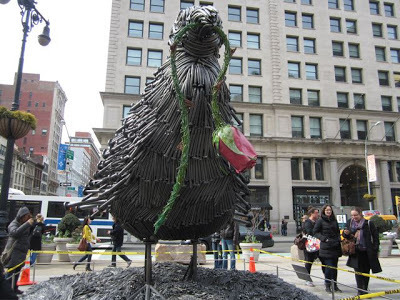
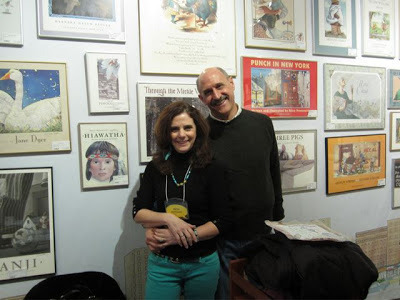
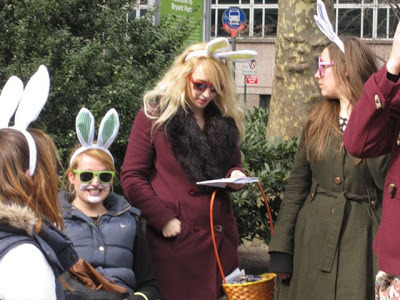

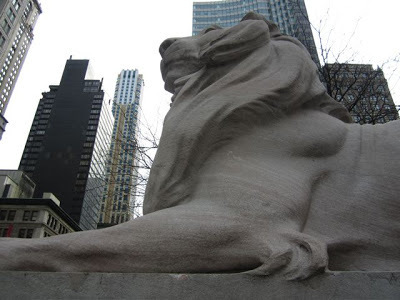
Yesterday, in New York City, I joined the great cast of writers that
the truly great David Levithan had gathered at Books of Wonder, a store famous and hallowed and grand.
I met a student with a future, a librarian with a heart, a blogger with whom I'd corresponded, an AP English teacher, a science fiction writer, a
screenplay writer, super cool Wonder staff, others. K. M. Walton and I
compared war stories (we always do; this time I won). A.S. King swore
she'd been practicing her salsa (but I don't know; the girl does write
fiction). David revealed some of the new work on his Scholastic list,
and I sort of begged, I hope that's okay, for one of the ARCs. He also talked a bit (only because I asked) about his own Invisibility (with Andrea Cremer), due out this summer.
(David
Levithan did not reveal, however, how he maintains his fresh-faced good
looks after his long and uber successful week of moderating and hosting countless (all right, so someone counted them, probably even David himself) YA panels and
conversations.)
And then something else amazing
happened: Ed Goldberg, who wrote to me following the launch of HOUSE OF
DANCE and who has remained in touch ever since—a stalwart cheerleader in
times both green and fallow, a teacher, a librarian, a garden lover, a
dad, a man in love with his Susan—took the train into the city and
surprised me. Yes, indeed, the surprise was gonzo. And Beth Kephart, born on April Fools' Day, does not easily surprise.
After the signing, I wove through New York City. I share my quick snapshots here.
On the train there and back, I was reading Elizabeth Graver's new novel, The End of the Point.Help me, Rhonda: I can't wait to tell you about her book. (That is, if you
haven't already read about it everywhere, my friend Elizabeth now on bestseller
lists everywhere.)




Published on March 25, 2013 07:01
March 24, 2013
public service announcement

Even if the glazing on your bisqued pottery looks like the faded Victorian pillow you would hide if friends were coming, even if you ruin the final grapevine sequence of a tango in front of 300 very wealthy people who weren't really watching anyway, even if you finally think you're harnessing your novel until you read page 61 at 3:37 in the morning and page 61 is not so very excellent, even if you need a haircut and are going to NYC without one,
Even if
Hold your head up high.




Published on March 24, 2013 05:09








